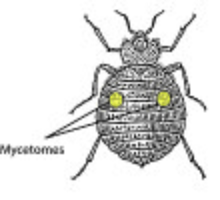Mycetome

A mycetome is a specialized organ in a variety of animal species which houses that animal's symbionts, isolating them from the animal's natural cellular defense mechanisms and allowing sustained controlled symbiotic growth. In several species, such as bed bugs and certain families of leech, these symbionts are attached to the gut and aid in the production of vitamin B from ingested meals of blood.[1] In insects, the organisms that inhabit these structures are either bacteria or yeasts.[2]
In bed bugs, it has been found that heat stress can cause damage to the mycetome, preventing the symbionts from being successfully passed from the adult female to her eggs at the time of oogenesis, causing the resulting nymphs to develop abnormally or to die prematurely.[3]
References
- ^ Yoshinori Tanada; Harry K. Kaya (2 December 2012). Insect Pathology. Academic Press. p. 33. ISBN 978-0-08-092625-4.
- ^ R. F. Chapman; Reginald Frederick Chapman (12 November 1998). The Insects: Structure and Function. Cambridge University Press. p. 87. ISBN 978-0-521-57890-5.
- ^ Rukke, Bjørn Arne; Sivasubramaniam, Ranjeni; Birkemoe, Tone; Aak, Anders (2018). "Temperature stress deteriorates bed bug (Cimex lectularius) populations through decreased survival, fecundity and offspring success". PLOS ONE. 13 (3): e0193788. Bibcode:2018PLoSO..1393788R. doi:10.1371/journal.pone.0193788. PMC 5851602. PMID 29538429.
